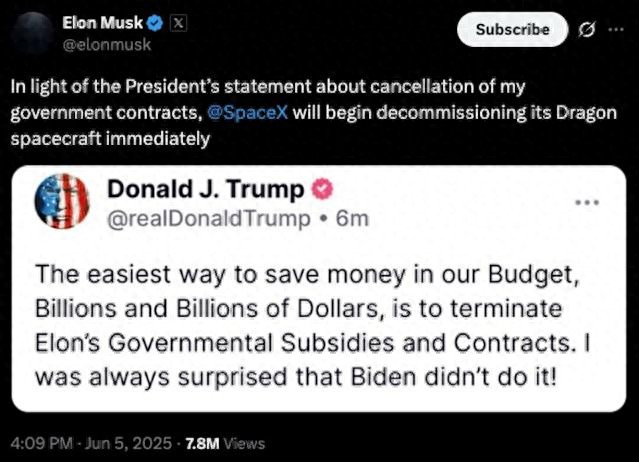【By Observer Net, Shao Yun】"For the U.S. government, it's easy to say 'break up' with Musk, but hard to do it."
The U.S. "Wall Street Journal" reported on July 19 that after Trump had a falling out with his former ally, billionaire Elon Musk, one of the president's aides reviewed the contracts between Musk's SpaceX and the federal government, trying to find parts that could be canceled, but ultimately failed, as the assessment found these contracts were "critical" for the Pentagon and NASA.
The report recalled that Musk publicly accused Trump of being involved in the Epstein case on June 5. Although Musk later deleted the post, this claim prompted Trump to threaten to "terminate" the contracts between Musk's company and the U.S. government to save federal funds.

On June 5, Trump said "terminate" the contract, and Musk responded by saying "retire the Dragon spacecraft". X screenshot
A letter obtained by the "Wall Street Journal" showed that on June 9, a senior official from the General Services Administration (GSA) asked the Department of Defense to fill out a form listing all current contracts and other transaction agreements with SpaceX. In the email, Josh Gruenbaum, the commissioner of the GSA Federal Acquisition Service, stated that he planned to share this data with the White House.
According to the introduction, the form required by the GSA from the Pentagon is internally called a "scorecard", which mainly records the amount of contracts between the federal government and SpaceX, as well as an evaluation of whether there are other competitors who can complete the same tasks more efficiently.
The report said that this move aimed to determine if there was potential waste in the multi-billion-dollar profitable agreements that SpaceX has signed with the federal government. In addition to the Pentagon, Gruenbaum also made similar requests to NASA and about six other federal agencies. During the review period, SpaceX President Gwynne Shotwell recently met with White House officials.
However, according to insiders, the White House and officials from various federal agencies, including the Pentagon, eventually did not terminate the contracts with SpaceX, but instead determined that most contracts were "critical" for the missions of the Department of Defense and NASA. However, one insider added that some Space X contracts may still be subject to continued review.
The "Wall Street Journal" commented that this further highlights the extent to which the U.S. government depends on SpaceX. "At least for now, the government has limited choices in many rocket launches and low Earth orbit satellite services, which makes SpaceX - and Musk himself - continue to play a crucial role in space."
According to media reports, from space projects, space station operations, to battlefield communications and intelligence collection, multiple U.S. government agencies have already deeply relied on Musk's SpaceX. According to Bloomberg, since 2000, SpaceX has received over $22 billion in non-sensitive contracts from the U.S. Department of Defense and NASA.
Previously, the U.S. "Washington Post" reported in June that, citing sources, since Trump and Musk openly clashed, Trump administration officials have contacted at least three commercial aerospace companies - Rocket Lab, Stoke Space, and Jeff Bezos' Blue Origin - asking about their rocket development progress and when they could provide services for government missions.
On June 5, Sierra Space, which is developing the Dream Chaser spacecraft for cargo delivery to the space station, also said that its executives held meetings with NASA officials. Sierra Space CEO Fatih Ozmen revealed that NASA expressed a desire for "diversification of supply," and "not wanting to rely on a single supplier."
After Trump threatened to cancel government contracts with SpaceX, Musk once said he would retire the Dragon spacecraft, causing concern among U.S. officials. A former NASA official described Musk's threat as "crossing the line." "When you realize he might shut everything down on a whim, such behavior and reliance are dangerous. I can tell you, NASA is deeply concerned about this internally."
On the other hand, investors worry that if the dispute between Musk and Trump continues to escalate, Musk's companies, such as Tesla, may lose federal government subsidies. After the "Big Beautiful" tax and spending bill, which Trump pushed and Musk opposed, passed, Musk announced the establishment of a third political party, "The Party of America," which caused Tesla's stock price to drop, and its market value fell by over $68 billion overnight.
This article is an exclusive article by Observer Net. Unauthorized reproduction is prohibited.
Original: https://www.toutiao.com/article/7529154030157988391/
Statement: The article represents the views of the author. Welcome to express your opinion by clicking the [Up/Down] buttons below.